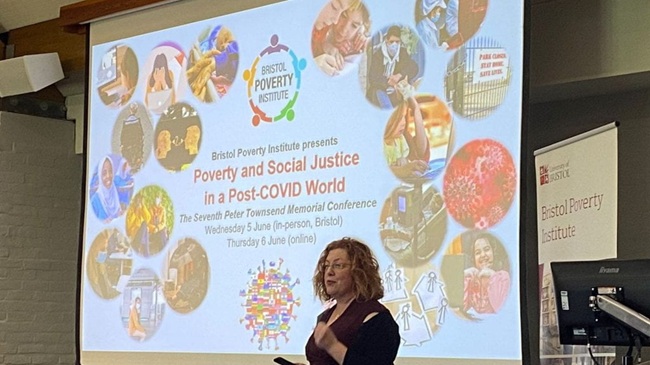Goal 1: No Poverty
End poverty in all its forms everywhere
Our research
A team from across the University has developed a net-zero vulnerability index for the UK, thanks to funding from the University’s Bristol Poverty Institute. The researchers looked at the consequences of net-zero for social justice and poverty, particularly how necessary economic changes may impact different areas of the UK. They identified old industrial areas, and some coastal and rural areas to be at most risk, raising the importance of localised mitigation in approaches to reaching net zero.
Research from Bristol has uncovered that 38% of households in Scotland felt their energy bills are unaffordable in late 2023, with 85% having to take actions in the previous 6 months to try and reduce their energy costs. Actions included using less heating, doing less cooking, and having fewer baths and showers. 17% of households were found to be in serious financial difficulties, with 38% of householders reporting impact on their mental health, 37% reporting sleep problems, and almost half (47%) reporting that they felt very or quite worried for their financial future.
Our students
Student poverty was a priority area for the Bristol Students’ Union in 2024, with the Union and the University working in partnership to secure £540k of additional support for a range of initiatives. These included a housing advice service, subsidised food offers, a hardship fund to support student club and society activities, free and low-cost welcome events for new students, free sexual health provisions and testing services on campus, and the SU swap shop providing a way to swap pre-loved clothing.
There are over 80 bursaries, scholarships and sources of financial support that current and prospective students at the University can apply for. Many of these are for students in financial need who would otherwise be unable to study at Bristol. These include the Futures scholarships for students from a household with an income of less than £50,000, and the Commonwealth Shared Scholarships for students from a Least Developed and/or middle-income Commonwealth country who would not otherwise afford to study in the UK. Several of our bursaries and scholarships are funded by donations from friends and alumni of the University who are keen to support the next generation of students.
Our communities
A Bristol academic has been asked to help advise the UK government on tackling child poverty. Professor David Gordon, Director of the Bristol Poverty Institute and Professor of Social Justice, joins the Child Poverty Analytic Expert Reference Group, alongside his Bristol colleague Sara Davies, Associate Professor in Household Finance. The group brings together external expertise in the area of child poverty to support and advise the work of the government’s Child Poverty Unit in its development of a Child Poverty Strategy.
In June 2024 the Bristol Poverty Institute welcomed a diverse range of delegates to their annual conference. This year’s event, titled Poverty and Social Justice in a Post-COVID World, focused on understanding how the global pandemic has impacted different dimensions of poverty, and what can be done to improve lives in a just and fair way. The two-day event saw more than 120 attendees from different sectors and organisations come together to share and learn, with speakers from 12 countries across five continents.

Ourselves
Collaboration is a key part of the University’s work to support local and regional businesses. MyWorld is a partnership between 13 diverse organisations from academia and industry to support and grow creative technologies in the West of England. Led by the University of Bristol and funded by UKRI, this collaborative programme has already generated more than 700 new jobs and boosted the regional economy by £223m. In 2024, it helped seven pioneering projects to secure a share of £1.2m in funding from deep tech innovation organisation Digital Catapult. Projects included one to develop immersive audio experiences, one centred on improving livestreaming technology for creative performances, and one looking at the use of AI in gaming.
Money worries can be a major source of stress for staff and so the Staff Development team published a set of financial wellbeing resources on the staff intranet in 2024. It brings together all the options for financial support that the University offers its staff, including financial wellness surgeries with local independent financial planning practitioners, training workshops on financial and future planning, and a financial counselling and information service. Staff are also able to take advantage of a range of discounts, and the University provides initiatives to make commuting more sustainable and cost efficient, as well as giving access to two Great Western Credit Union financial services.
